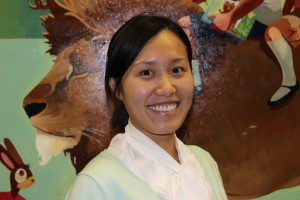
Senior, public relations, from Johannesburg, South Africa
“Everyone in south Africa has gates and bars on their windows. My first night in the U.S. I remember thinking ‘Somebody is going to climb through my window,’ because there were no barriers between the street and my room.” (Photo by Haley Tharp)

Junior, food science, from FuZhou, FuJian Province, China
“I was really shocked how people would kiss in public. In China, people have to think about the reputation of their family, so they never do those things in public.” (Photo by Haley Tharp)

Sophomore, finance, from Hidalgo, Mexico
“Dating. My first week I got here, I saw a girl on a date with one guy. Then the next weekend she was hanging out with a different guy. I thought, ‘That’s so wrong! You’re cheating on him!’ In Mexico, you only go on a date with someone when things are getting serious. It was really weird.” (Photo by Haley Tharp)

Senior, supply chain management, from Smolensk, Russia
“We say Americans smile too much, because for us smiling isn’t the natural expression, so we think it’s a little bit fake and hesitate answering questions because as Russians we don’t trust each other in the first place.”
(Photo by Haley Tharp)
Just because America is a melting pot does not mean that all international students fade into the mix without facing some significant cultural barriers.
International students said they have noticed major differences in the family dynamic of American families when compared with their own, despite the common link of the culture of The Church of Jesus Christ of Latter-day Saints.
BYU student Max Borodin grew up more than 5,000 miles away in Smolensk, Russia. His move to the U.S. brought on a whole new spectrum of cultural practices, including unfamiliar family dynamics.
“In Russia, generations are connected very closely,” Borodin said. “Three generations can live under the same roof so there’s a lot of influence about culture and history, but Americans seem to be much more individualistic.”
Thousands of miles south of Smolensk, Chinese BYU student Jenny Yu Zhang experienced her own unique culture of family ties that is not often spotted in the United States. Unlike Russia, familial ties in China take on a greater financial expectations.
“When your parents grow older in China, kids are expected to support them financially,” Zhang said. “It is very common for the oldest son in the family to have the huge responsibility of caring for his mom and dad financially.”
Differences in the dynamic of the family unit is not the only thing that caught South African student Savannah Bassett off guard. When her family moved to Georgia when she was 16, Bassett struggled to get used to the American education system.
Bassett explained that in South Africa, students go to high school for five years. The first two years are spent taking general education classes. The next three years, however, focus on three specific subjects that students will study in order to prepare them for their careers.
“They gear you toward knowing what you’re going to do with your life at a very young age,” Bassett said. “It can be rewarding, but very detrimental if you don’t have any idea of what you want to do.”
Jenny Yu Zhang’s experience with the American education system is also much different from what she was accustomed. Zhang said even though Chinese students seem to study harder, the American education system certainly has its advantages.
“In America when you are young, teachers teach you how to think and why you think,” Zhang said. “In China we just memorize and don’t really have discussions about why things happen, but in China we have a better foundation because we remember a lot of facts.”
Despite vast diversity between cultures in education and family ties, BYU professor of marketing and international business R. Bruce Money said he believes the benefits of understanding other cultures in the business world are invaluable.
“Understanding other cultures is essential for business because you can’t get growth in the U.S. markets anymore,” Money said. “You have to go abroad to the emerging markets, and to do that, you have to understand the subtleties of countries in terms of culture.”
Money is not alone in his belief in the significance of understanding other cultures. Students like international student Diana Jaen said she has come to see all that there is to gain from studying up on cultural practices from around the world and experiencing the good and the bad of what culture has to offer.
“Understanding other cultures gives you experience that helps you choose the best of both worlds,” Jaen said. “Sometimes it’s not right or wrong, it’s just different. People become more sympathetic and less judgmental, and overall become better people for it.”




